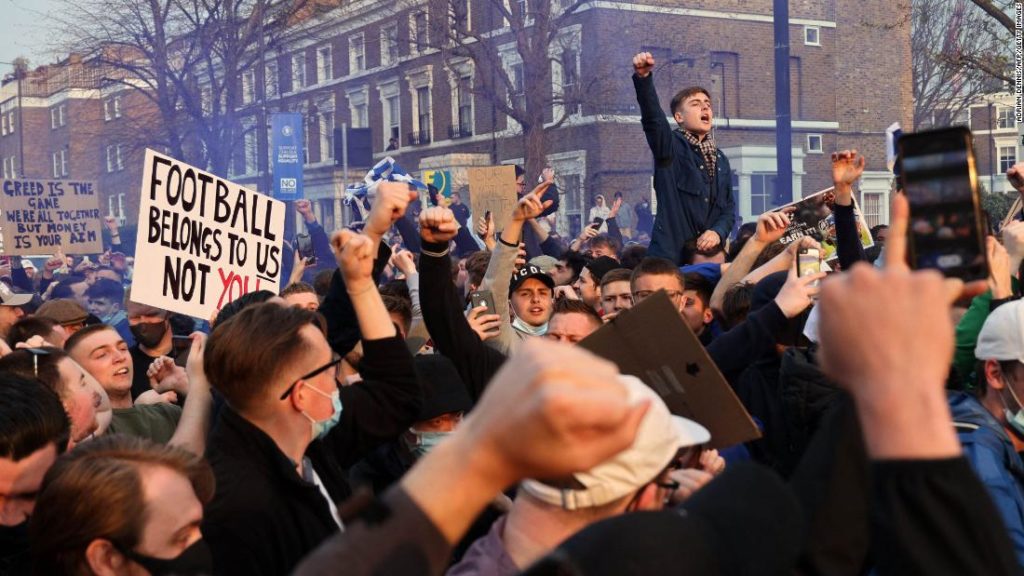These were the three defining words of a week that shook European football’s very foundations.
On April 18, 12 of Europe’s biggest, most successful and financially powerful clubs — subsequently dubbed the “Dirty Dozen” — announced their intention to breakaway from the current UEFA competition format and create their very own Super League.
As football fans began to grapple with the concept, it didn’t take them long to vehemently criticize the move as one fueled by greed, the desire to hoard more money and wield more power than they already do.
Except, as many fans pointed out, some of the 12 founding super clubs really aren’t all that super.
Tottenham Hotspur has won just one League Cup in the past 30 years; Arsenal hasn’t qualified for the Champions League since 2016 and AC Milan since 2013; and Inter Milan hasn’t progressed from the group stages since 2011.
This was a power grab intended to guarantee the Super League’s founding members status and revenue, which some of them aren’t currently earning from their performances on the pitch.
The Super League’s structure goes against the very essence of what makes European football so compelling.
Promotion and relegation allows supporters of teams further down the football pyramid to dream that, one day, they might well be able to compete against the very best.
Fan fury
It proved, despite the slogans of unity that these clubs peddle to drum up support and create a sense of togetherness — one Liverpool slogan is “This Means More” — that their connection to fans is wafer thin. Supporters are seen only as “consumers.”
As more details of the Super League’s plan emerged, this coterie of owners provided plenty of evidence that they do not understand the connections that bind clubs to supporters.
It has been widely reported that Super League clubs view their traditional supporter base — those that go to the games and are part of the communities in their cities — as “legacy fans.”
Instead of catering to “legacy” supporters,” the Super League clubs — which see themselves as “content providers” — wanted to pivot towards “fans of the future,” those that are more interested in seeing superstar names go head-to-head.
Supporters were joined in their indignation by politicians and the heads of governing bodies — though cynics might argue this was to boost their own political or financial interests, rather than a true belief in football’s greater good.
UEFA President Aleksander Ceferin said he had previously been reassured by Juventus chairman Andrea Agnelli that the Italian club would not be signing up for the new format.
“I thought we are also friends, but I was wrong. For me, it’s always better to be naive than to lie all the time,” Ceferin said, previously referring to those involved as “snakes.”
“Their chairman approved something and then ran away, and he’s still hiding probably somewhere, I don’t know where he is.”
To make matters even more awkward, Ceferin is godfather to Agnelli’s daughter.
Fan power
Spending time together in their boardroom bubble has isolated these wealthy businessmen from the widely held belief that football exists for the fans and because of the fans.
What we saw in those 48 hours — and beyond — as the Super League project unraveled was a reminder to football’s power brokers that supporters should never be bypassed like this again.
On Tuesday, Chelsea’s fans gathered in protest outside of the club’s Stamford Bridge stadium, holding up the team bus as it attempted to make its way to the ground for their Premier League match against Brighton.
As crowds gathered, there was a moment — almost like the flick of a switch — when angry jeers turned to whooping cheers.
But it wasn’t just outside of Stamford Bridge, supporters of Tottenham, Liverpool, Manchester United, Manchester City and Arsenal had descended on their respective stadiums to make their feelings known.
Soon after, however, Atlético Madrid, Inter Milan, AC Milan and Juventus all announced they, too, would be pulling out, leaving just Barcelona and Real Madrid committed to the project. And committed they remain.
While the outcome was ultimately a win for football fans, news over this past week has understandably left a bitter taste in the mouth for many.
You may also like
-
Super League: UEFA forced to drop disciplinary proceedings against remaining clubs
-
Simone Biles says she ‘should have quit way before Tokyo’
-
Kyrie Irving: NBA star the latest to withhold vaccination status
-
Roger Hunt: English football mourns death of Liverpool striker and World Cup winner
-
‘Every single time I lift the bar, I’m just lifting my country up’: Shiva Karout’s quest for powerlifting glory

